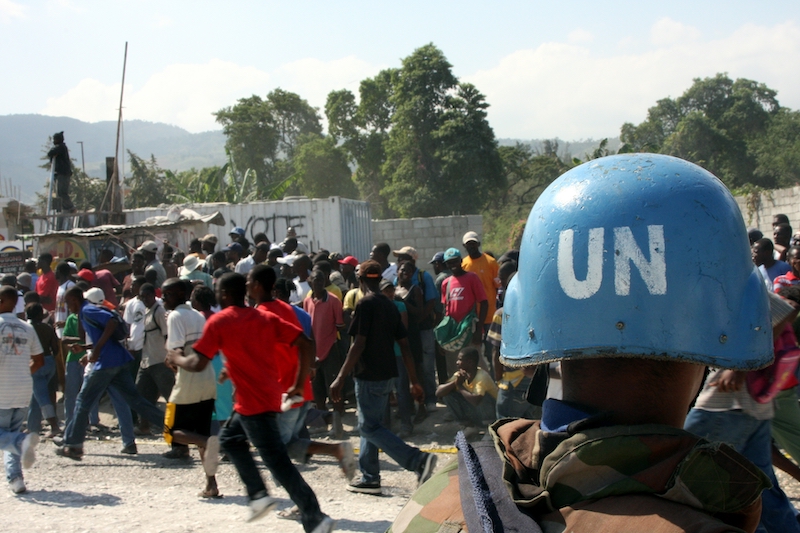
Trigger Warning: The following article refers to sexual violence, which may be distressing for some readers.
Haiti is facing one of the most harrowing humanitarian crises in the world.
Gripped by relentless gang violence, 20,000 people have fled the capital, Port-au-Prince, in the past week alone. Women and girls are disproportionately affected by the brutality, with many being systematically subjected to sexual violence.
Haiti is the poorest country in Latin America, with approximately 25% of its population living on a dollar a day. It is incredibly vulnerable to natural disasters; the 2010 earthquake claimed over 300,000 lives and displaced countless more.
The assassination of President Moïse in 2021 galvanised the turbulent political conditions, creating a void of leadership swiftly seized by politically motivated gangs with strong ties to the country’s elites and politicians. In the capital, a coalition of two rival gangs, G9 and G-Pèp, control around 80% of the city.
The main international airport is currently closed after gangs opened fire at a Spirit Airlines’ commercial aircraft as it was landing, injuring a flight attendant. Coupled with the groups’ control of roads and restriction of the main seaport entrance, humanitarian aid has been brought to a standstill, as they struggle to import essential supplies. Doctors Without Borders has now suspended its work in the region after staff were threatened with death and rape. The OHCHR has reported a minimum of 4000 deaths from gang violence in 2024 alone.
The roots of gang violence in Haiti are often traced to the Duvalier dictatorship, which spanned almost 29 years from 1957 to 1986. The Tonton Macoutes, a paramilitary group, was formed to crush opposition to the regime. While they were formally disbanded in 1986, their influence persists in the brutal methods of Haitian gangs today, including the use of sexual violence to punish opposition.
This legacy has been evidenced for decades; in 1994 the UN Human Rights Council reported the use of rape in Haiti as a “weapon of terror”.
The situation has only worsened. In 2022, the UN found that armed groups used sexual violence to expand and reinforce their territory. This includes punishing those who may be supportive of, or live under, another gang.
Deliberate intention to humiliate the victims is evident in their tactics, such as the gang rape of women, girls and boys in public spaces and in front of family members. The mutilated bodies of partners of gang leaders were spread on social media. This intent to maximise humiliation was also evidenced in the reports of older women being assaulted during turf wars in Martissant in March 2022, particularly striking given Haitian culture greatly values respect for the elderly. In the document, the UN claim that this is intended to “break apart the social fabric”.
Women and girls are attacked for crossing the “frontlines”, as they travel to work, study or carry out daily activities. The same report also identified kidnapping for ransom as a major source of revenue for gangs; on occasion, videos of the rapes were used to pressurise relatives into paying, sometimes forcing them to sell or mortgage their homes. The UN also found the coercion of women and girls into sexual relationships with gang members in exchange for water, food and protection from abuse. Refusing can result in assault, murder or arson attacks against themselves and their family.
It is important to note that whilst women and girls bear the brunt of this violence, men and young boys are also subjected to sexual violence by groups. Additionally, members of the LGBTI+ community are targeted for “corrective rapes” to “cure” their sexuality.
The number of violent crimes committed is unknown due to the strong stigma surrounding sexual violence, fear of retribution and a dearth of support services. Damningly, the former President of the Haitian Supreme Court André Cherilus said that it wasn’t “worthwhile for the victim of rape to go to the police to report the crime … It would be even worse for the woman, given the extremely high probability of retaliation.”
The region’s inaccessibility to humanitarian aid will only worsen the impact on women and girls. Last year, Doctors Without Borders supported 3700 victims of sexual violence and intimate partner abuse, an increase of 42%. Without their support amid worsening conditions, more will suffer. Access to healthcare, for example reproductive care, is already in a dire state.
As Haitians face tremendous uncertainty and fear, immediate support from the international community is vital to ease their suffering. The weaponisation of sexual abuse against women for power is a brutal example of the ruthlessness of the gangs that are prospering; they must be challenged.
Image: A Sri Lanka soldier attached to the United Nations forces in Haiti watches as a mob-like crowd surges to the check point where Haitians presented a food voucher to receive rations at a distribution point in Carrefour, Haiti. 24th Marine Expeditionary Unit Marines, with a handful of U.N. soldiers, kept the distribution process orderly and free of disruption, United States Marine Corps Official Page, 2010 // CC0 1.0 UNIVERSAL



Average Rating